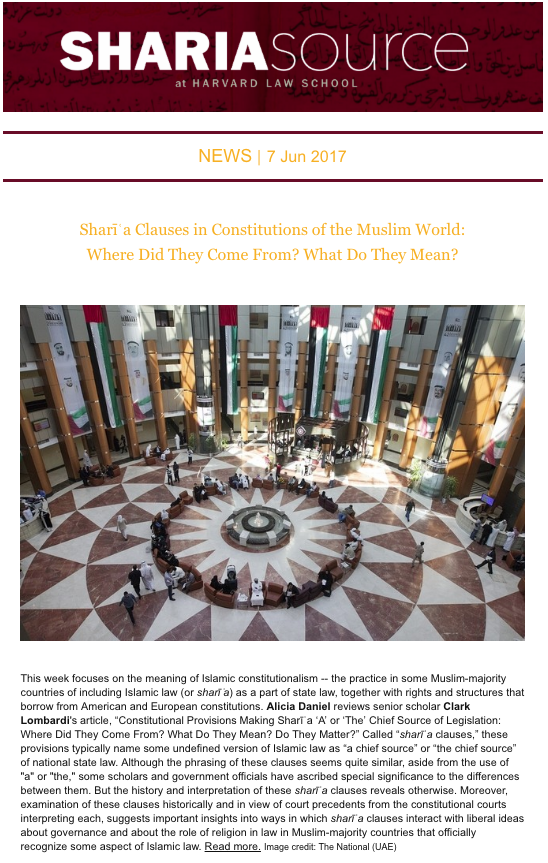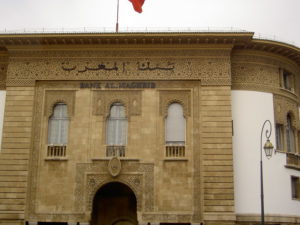
 Sharīʿa Clauses in Constitutions of the Muslim World: Where Did They Come From? What Do They Mean? This week focuses on the meaning of Islamic constitutionalism — the practice in some Muslim-majority countries of including Islamic law (or sharī ͑a) as a part of state law, together with rights and structures that borrow from American and European constitutions. Alicia Daniel reviews senior scholar Clark Lombardi’s article, “Constitutional Provisions Making Sharīʿa ‘A’ or ‘The’ Chief Source of Legislation: Where Did They Come From? What Do They Mean? Do They Matter?” Called “sharīʿa clauses,” these provisions typically name some undefined version of Islamic law as “a chief source” or “the chief source” of national state law. Although the phrasing of these clauses seems quite similar, aside from the use of “a” or “the,” some scholars and government officials have ascribed special significance to the differences between them. But the history and interpretation of these sharīʿa clauses reveals otherwise. Moreover, examination of these clauses historically and in view of court precedents from the constitutional courts interpreting each, suggests important insights into ways in which sharīʿa clauses interact with liberal ideas about governance and about the role of religion in law in Muslim-majority countries that officially recognize some aspect of Islamic law. Read more. Image credit: The National (UAE)
Sharīʿa Clauses in Constitutions of the Muslim World: Where Did They Come From? What Do They Mean? This week focuses on the meaning of Islamic constitutionalism — the practice in some Muslim-majority countries of including Islamic law (or sharī ͑a) as a part of state law, together with rights and structures that borrow from American and European constitutions. Alicia Daniel reviews senior scholar Clark Lombardi’s article, “Constitutional Provisions Making Sharīʿa ‘A’ or ‘The’ Chief Source of Legislation: Where Did They Come From? What Do They Mean? Do They Matter?” Called “sharīʿa clauses,” these provisions typically name some undefined version of Islamic law as “a chief source” or “the chief source” of national state law. Although the phrasing of these clauses seems quite similar, aside from the use of “a” or “the,” some scholars and government officials have ascribed special significance to the differences between them. But the history and interpretation of these sharīʿa clauses reveals otherwise. Moreover, examination of these clauses historically and in view of court precedents from the constitutional courts interpreting each, suggests important insights into ways in which sharīʿa clauses interact with liberal ideas about governance and about the role of religion in law in Muslim-majority countries that officially recognize some aspect of Islamic law. Read more. Image credit: The National (UAE)
 Islamic Finance: New Developments in Morocco’s Sharīʿa-Compliant Banking Morocco editor Ari Schriber recently interviewedNour-Eddine Qaouar, a sharīʿa auditor at Dar Assafaa, the Islamic window of Attijariwafa Bank in Morocco. The interview sheds light on Morocco’s recent efforts to develop a system of sharīʿa-compliant banking. The interesting feature of Morocco’s attempts is that it must confront Issues unique to its preferred school of law, Mālikism, with the other main Islamic finance systems (in SE Asia and in the Gulf), which tend to adopt the interpretations of other Islamic legal schools of how a sharīʿa-compliant financial system should look. Read more. Image credit: Morocco News
Islamic Finance: New Developments in Morocco’s Sharīʿa-Compliant Banking Morocco editor Ari Schriber recently interviewedNour-Eddine Qaouar, a sharīʿa auditor at Dar Assafaa, the Islamic window of Attijariwafa Bank in Morocco. The interview sheds light on Morocco’s recent efforts to develop a system of sharīʿa-compliant banking. The interesting feature of Morocco’s attempts is that it must confront Issues unique to its preferred school of law, Mālikism, with the other main Islamic finance systems (in SE Asia and in the Gulf), which tend to adopt the interpretations of other Islamic legal schools of how a sharīʿa-compliant financial system should look. Read more. Image credit: Morocco News
 Circulaire Bank al-Maghrib The shari’a board of the Central Bank of Morocco issued a new memorandum (circulaire) in January 2017 with a diverse set of fatwās and regulations governing Islamic financial instruments in Morocco. This new memorandum follows a recent practice of The Central Bank, which has been gradually increasing the rate at which it issues such memoranda since the Participatory Finance Law 103.12 was issued in 2015 in favor of Islamic finance industry. See the document. Image credit: Middle East Confidential
Circulaire Bank al-Maghrib The shari’a board of the Central Bank of Morocco issued a new memorandum (circulaire) in January 2017 with a diverse set of fatwās and regulations governing Islamic financial instruments in Morocco. This new memorandum follows a recent practice of The Central Bank, which has been gradually increasing the rate at which it issues such memoranda since the Participatory Finance Law 103.12 was issued in 2015 in favor of Islamic finance industry. See the document. Image credit: Middle East Confidential
See the full newsletter.

